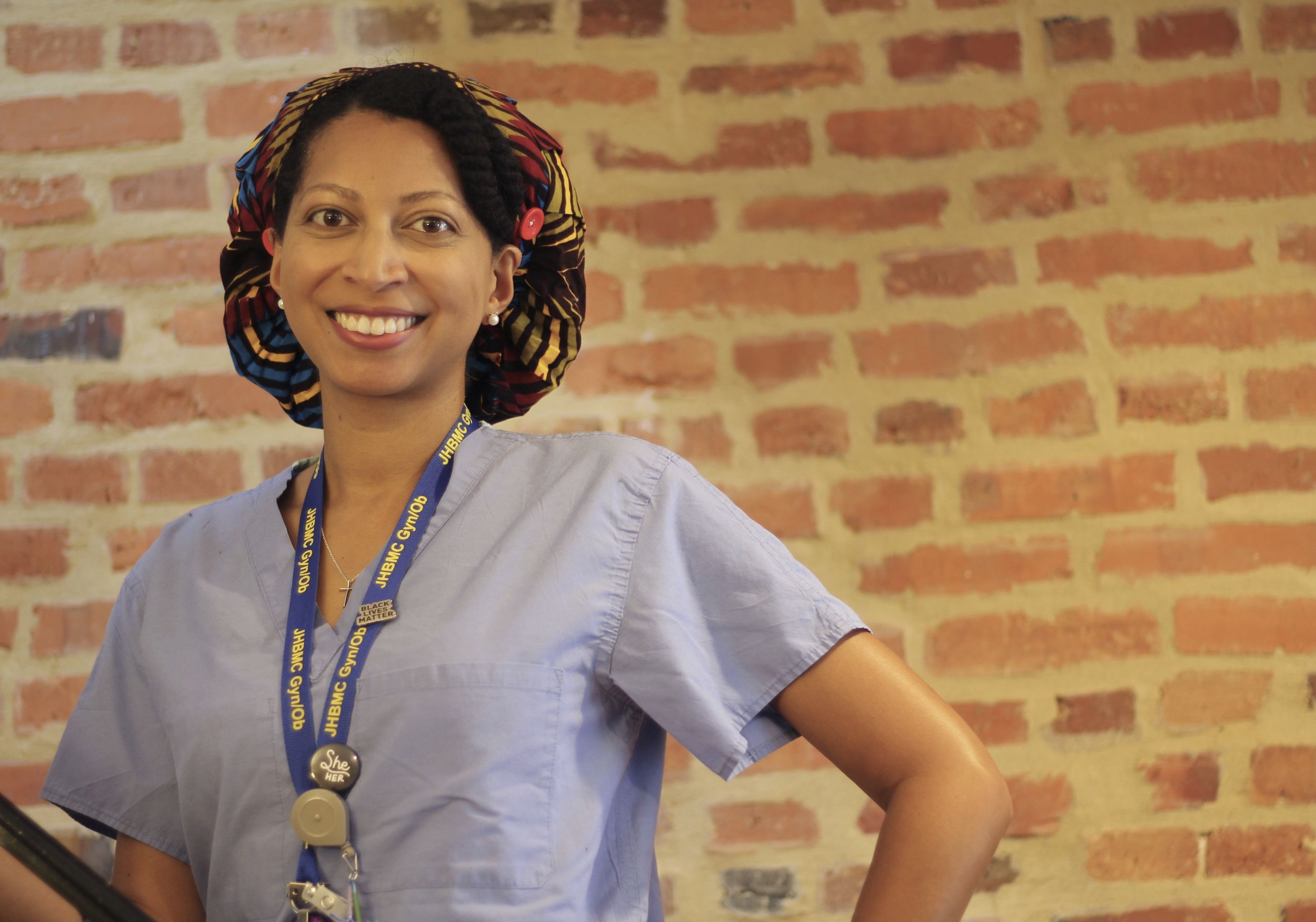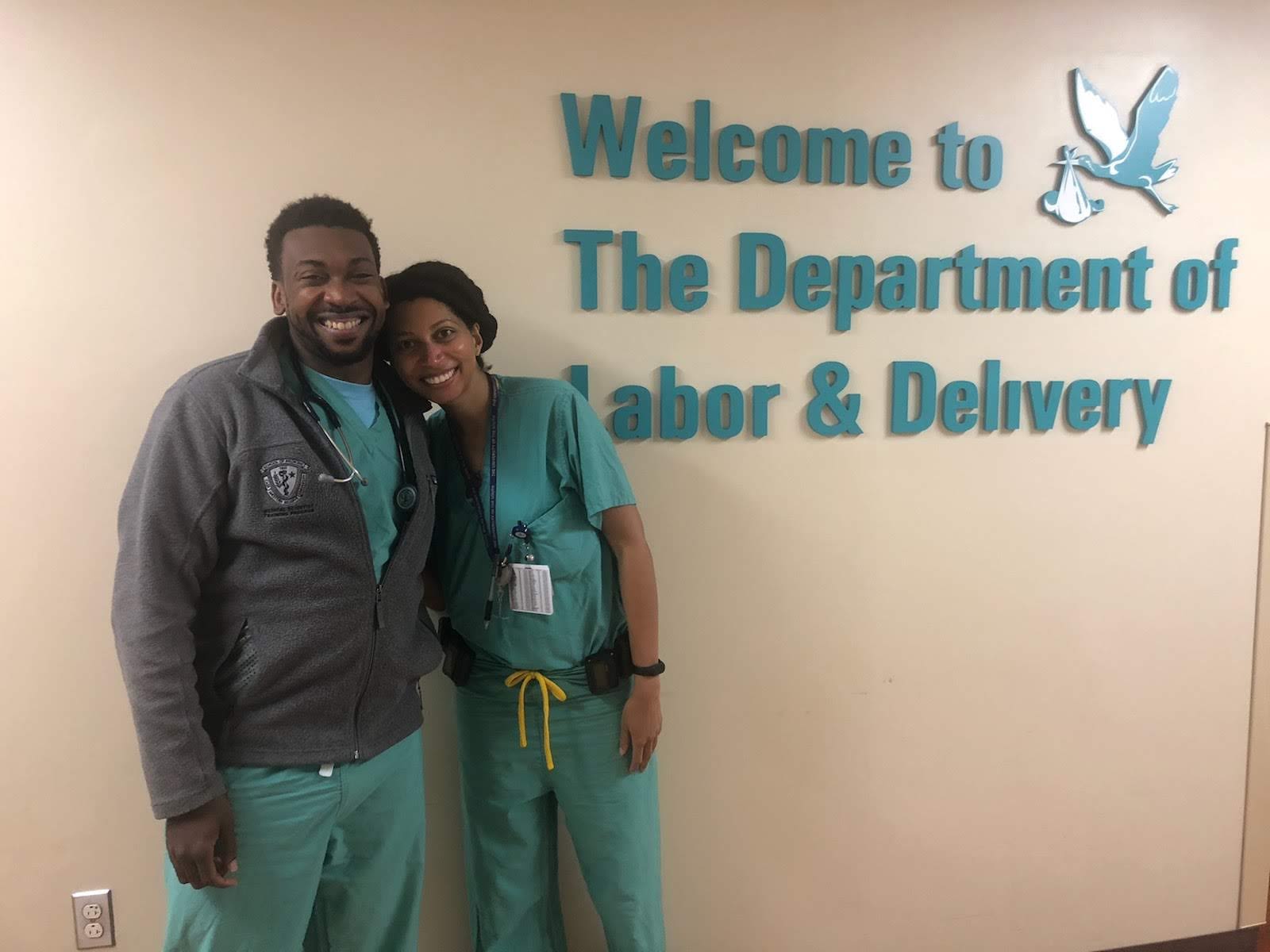Answering the “Why?”
Fourteen years after she became Sewanee’s first Black student to be named a Fulbright Scholar, Dr. Charita Roque, C’07, is combining social justice advocacy with research into the factors that drive disparities in women’s health outcomes.

IN THE SPRING OF 2007, Charita Roque, C’07, became Sewanee’s first Black student to be awarded a Fulbright Scholarship. That fall, she traveled to the small West African nation of Benin to begin research on maternal mortality, visiting hospitals throughout the country to review their records to determine, from what she could find, causes of death.
Connecting recently over Zoom from her home in Baltimore, Maryland, Roque remembers her surprise at being awarded a Fulbright. “It was not on my radar as something I could do,” she says. “I thought it was something that only other people could do.”
Now, after graduating from medical school and completing a residency in obstetrics and gynecology, Roque is at the Johns Hopkins School of Medicine, completing a two-year fellowship in complex family planning that is designed to provide physicians with training in research, teaching, and clinical practice in complex abortions and contraception.
The intersection of research and social justice advocacy excites Roque. Her research looks at disparities in the incidence of abortion complications among different groups of people identified by various demographic distinctions, including race.
“Race is a social construct, right?” she asks, and then nods to answer her own question. “For example, preterm delivery is more common among African American women. But why?” For Roque, answering that question is a matter of comprehending the big picture anew. “It’s not just interpersonal racism. It’s also structural and institutional racism. Just saying that Black patients have a higher incidence of preterm delivery—well, that doesn’t mean anything. You’re not saying why. And, the actual why is what I’m working on.”
Roque wants to unravel the hidden factors behind the proxy of race and ethnicity that ultimately drive health disparities. This purpose took shape during her Fulbright fellowship in Benin after four years at Sewanee, where she found mentorship and opportunities to develop personally and intellectually.
Roque grew up within a small, close-knit family in Fort Wayne, Indiana, and came to Sewanee with aspirations of becoming a veterinarian. As a freshman at Sewanee, she volunteered at a vet clinic in South Pittsburg. At the same time, she began exploring majoring in French studies and Spanish with a view toward international studies.
“Just saying that Black patients have a higher incidence of preterm delivery—well, that doesn’t mean anything. You’re not saying why. And, the actual why is what I’m working on.”
The challenges of navigating the South as a Black person highlighted for Roque the importance of developing community and finding mentors. Like many Black students over the years, Roque would find support and guidance in longtime Student Life staffers Barbara Banks and Eric Benjamin, who helped her navigate campus socially and encouraged her to pursue opportunities for conscious growth. “Ms. Barbara and Mr. Benjamin are that for so many of us,” Roque says. “Knowing Ms. Barbara and her couch were there was so helpful, just so helpful.”
By her junior year, Roque resolved to settle the conflict between her competing interests—international studies and pursuing admission to veterinary school. She set out to acquire funding for the upcoming summer to shadow a veterinarian full-time to affirm her veterinary dream. “But I couldn’t find a program that would give me funding to shadow in a vet clinic,” she says. Undeterred, she found a Sewanee program, the Lilly Summer Discernment Institute (now the Ministry & Service Internship Fund). Funded by a grant from the Lilly Endowment, Inc., the institute provided funding for Sewanee students to do vocational discernment through substantive summer experiences.

Charita Roque (right) with a colleague, Dr. DaShawn Hickman, at MetroHealth Medical Center in Cleveland, Ohio.
Charita Roque (right) with a colleague, Dr. DaShawn Hickman, at MetroHealth Medical Center in Cleveland, Ohio.
Roque used her funding to volunteer in a rural hospital in Ecuador while shadowing at a vet clinic on the side. At the hospital, she rotated between various departments and, to her surprise, discovered a strong affinity for obstetrics and gynecology. “I really liked it, and it struck me that the equipment at the vet clinic was much newer than what was available in the public hospital. The vet clinic is private, and people pay out of pocket for everything,” she says. “That’s what pushed me over to human medicine.”
When she returned to Sewanee for her senior year, she reassessed her plans. “I had to talk myself down,” she says, “because I’m allergic to cats.” Thumbing her necklace, a silver plate curled into the silhouette of a perched cat, she laughs and adds, “I adore cats, but I had to ask myself: ‘Charita, are you really going to be around something you’re allergic to 24/7?’”
During her senior year, Roque switched her major to the newly introduced international and global studies major. Charles Brockett—then a professor of international studies—encouraged her to apply for the Fulbright. Intuiting that there was a compelling relationship between Roque’s language learning in Spanish and French; her interests in international studies; and obstetrics and gynecology, Brockett mentored Roque as she crafted what would become her prize-winning application to conduct research on maternal mortality in Benin, a former French colony.
“That’s why we need mentors—because we don’t see these things in ourselves,” she says emphatically. “We are not necessarily aware of these opportunities. But someone who’s further along can see a global picture, knowing where you want to go and the stepping stones to help you get there.”
Roque’s research in Benin took her across the small country. She visited villages and community centers, conducting interviews with women and nurses in French about their experiences with delivery. She encountered structural and practical challenges in providing medical care to patients. “A lot of times when patients would arrive, there would be no blood in the blood bank,” she says. “So the patient’s family would be traveling to the next town over looking for blood.”
The research also yielded case after case of women dying from mismanaged illegal abortions. It disclosed how social determinants of health—including education, income, social status, and community context—affected health equity for women in the country. Becoming acquainted with this grim reality, the needless deaths of women from preventable causes, especially those in abortions, illuminated a path for intervention for her. She would conduct research that dug deep into the underlying issues—redlining, inadequate resources, low financial investment—that led to poorer outcomes for racial and ethnic minorities. Being able to articulate this purpose motivated Roque to formally pursue medical school.
Now on the other side of medical school and residency—she earned her medical degree at the Case Western Reserve University School of Medicine—Roque is setting new horizons. She is at Johns Hopkins not only to develop her research methodology further but also to gain invaluable technical skill in abortion procedures and insight into practical advocacy.
In Ohio, where she did her residency, employees at county-owned hospitals could not perform induced abortions. “If a patient came in telling me that she wanted an abortion—even if I can, even if have the skills, the facilities to do it—I was not legally allowed to perform the abortion. I could refer her to a clinic, but that also becomes an issue because it means they’re traveling, which is expense, which is taking time off of work, which is potentially childcare and maybe a hotel. The cost just rises and rises.”
Although abortion is legal in Ohio, restrictions, like a 24-hour waiting period before the procedure but after state-directed counseling that includes material to discourage the patient from having an abortion, limit access. In Maryland, restrictions like the 24-hour waiting period aren’t in place, and that fact has focused Roque’s advocacy.
“The 24-hour waiting period—that has no clinical benefit, so that’s a clear thing to fight against,” she says.
As Roque looks ahead into her career, she is committed to making a difference in women’s reproductive health. “I want to get the experience and the training, and this [the Northeast] is where most of the fellowships are for the most part,” she says. “But I’m probably not going to stay in a state that’s friendly to abortion. I’m going to go back to the Midwest or the South.” She is determined to go where her advocacy and training are most needed, where women’s reproductive rights and access are not the rule.
Inspired by mentors who have supported her, Roque is forging a radical legacy as a doctor in honor of her grandmother. “My grandmother, she wanted to be a nurse, and she wasn’t able to pursue it,” she says. “I feel I’ve been able to get into the profession on her behalf. I am where I am because so many people helped me along the way.” Now further along the way, Roque is dedicated to paying it forward by helping others—patients and the next generation of medical professionals alike.
